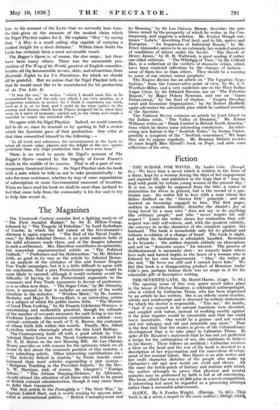The Magazines
The Nineteenth Century contains first a fighting analysis of "The First Socialist Budget," by Sir E. Hilton-Young, followed by "The Tragedy of Palestine," by Lord Sydenham of Combe, in which the full extent of the Government's dilemma is again exposed. "The End of the Naval Confer- ence," by Rear-Admiral Dewar, is an acute analysis both of the solid advances made there, and of the dangers inherent in such a settlement. Mrs. Hamilton contributes an optimistic, but somewhat ungrammatical article on "The Political Outlook." "Preference and the Referendum," by Mr. Richard Jebb, as good in its way as the article by Admiral Dewar, is an analysis of the mistakes Of this and former Empire Free Trade campaigns, but it is a little difficult to agree with the conclusion, that a pure Protectionist campaign would be more IikelY to succeed, although it would certainly avoid the difficulty Of having to use Protectionist arguments to the consumer and Free Trade arguments in favour of preference, as is so often now done. "The Sugar Crisis," by Mr. Ormesby Gore, is unusual in that it includes an account of the world situation in the industry. "Wireless Music," by Mr. Lennox Berkeley and Major R. Raven-Hart, is an interesting article on a subject of which the public knows little. "The Horrors of Good Plain Cooking," by Sir Francis Colchester-Wemyss, is entertaining and moderately practical, though his estimate of the number of servants necessary for such living is too low. Professor Lascelles Abercrombie contributes a critical—very critical—estimate of the work of T. E. Brown, the centenary of whose birth falls within this month. Finally, Mrs. Alfred Lyttelton *rites charmingly about the late Lord Balfour. The Contemporary leads off with a good article by Vice- Admiral Drury-Lowe on the Naval Conference, followed by Mr. E. D. Simon on the new Housing Bill. Sir Leo Chiozza Money provides us with reasons for the optimism which we all desire to feel about the economic position of this country, a very refreshing article. Other interesting contributions are : "The Activity School in 'Austria," by Paula Arnold—more balanced than most articles expounding a new system- '; Religions Teaching in the Provided Schools," by the Rev. A. W. Harrison, and, of course, Mr. Glasgow's "Foreign 4ffairs." "The African Sleeping-Sickness, by Africanus, should attract the attention of all those who wish to be proud of British colonial administration, though it may cause them to defer their transports. The first article in the Fortnightly is "The Next War," by Captain Liddell Hart, and is worth reading by anyone inter- ested in international-politics. "• British Unemployment and its Meaning," by Sir Leo Chiozza Money, describes- the pre• blems raised by the prosperity of which he writes in the Con- temporary, and suggests a solution. Mr. Evelyn Waugh con- tinues Labels," describing Port Said, and its life, native and . European. "An Impression of Industrial Russia," by Mi.. Peter Alexander, seems to be an extremely fair-minded analysis
of conditions of labour under the Soviet. The Novels of Henry James," by H.-M. Walbrook, is good reading if rather
, one-sided criticism. The Whirligig of Time," by Mr. Clifford Bax, is a collection of the verdicts of dramatic critics, which , have been rendered ridiculous by the changes of fashion-- some of them less so than others. They should be a warning , to some of our sterner minor prophets.
The Empire Review has an article on "The Egyptian Nego- tiations," from the Conservative point of view, by Mr. J. S. Wardlaw-Milne, and a very moderate one on the West Indian Sugar Crisis, by Sir Edward Davson, one on The Palestine Report," by Major Poison Newman, and one on " Game Preservation," by the Earl of Onslow. Empire Develop- ment and Economic Organization," by Sir Robert Hadfield, again advocates the admirable plan which he outlined recently in the Spectator.
. The National Review contains an article by fiord Lloyd on the Indian crisis, "The Valley of Decision. Mr. Ernest Williams writes on" Drink Control in British North America," from which he draws some interesting conclusions. An inter- esting new feature is the "Scottish Notes," by Scotus Viator, possibly a symptom of the "Scottish renaissance." We hope they are to appear regularly. Mr. Bonamy Dobree reviews at some length Miss Sitwell's book on Pope, and adds some "reflections of his own.






































 Previous page
Previous page